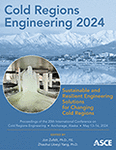Thermal-Stress Response Analysis and Applicability Study of Energy Shafts in Winter
Publication: Cold Regions Engineering 2024: Sustainable and Resilient Engineering Solutions for Changing Cold Regions
ABSTRACT
Energy shafts and energy tunnels are a kind of energy conservation and environmental protection underground structures. They can be used as shallow geothermal energy harvesting systems in cold regions. The theoretical research and practical application of energy shafts are still in the initial stage, and there are relatively few related experiments. This paper takes the Shanghai Taihe energy shaft test section in winter as the research background. It numerically analyzes the thermal-force response test of the energy shaft using COMSOL software. And compared with the Beijing Qinghuayuan energy tunnel for applicability evaluation and analysis. The results show that the heat exchange capacity of the Shanghai energy shaft is better than that of the Beijing energy tunnel due to the difference in the geological environment. Meanwhile, the temperature stress generated during heat exchange in Shanghai energy shafts is less than that in Beijing energy tunnels. Therefore, the energy underground structure is more applicable to the Shanghai strata in winter. Based on the thermal results and economic considerations, it is suggested that the inlet fluid velocity of the energy shaft is around 0.6 m/s in winter. The heat transfer tube spacing between 0.2 and 0.3 m can ensure a high heat transfer capacity.
Get full access to this chapter
View all available purchase options and get full access to this chapter.
REFERENCE
Agrawal, K. K., Agrawal, G. D., Misra, R., Bhardwaj, M., and Jamuwa, D.K. (2018). “A review of the effect of geometrical, flow, and soil properties on the performance of Earth air tunnel heat exchanger”. Energ Buildings, 176, 120–138.
Barla, M., Di Donna, A., and Insana, A. (2019). “A novel real-scale experimental prototype of energy tunnel”. Tunn Undergr Sp Tech, 87, 1–14.
Bi, J. F., Jiang, H., Ding, W. Q., and Bao, H. L. (2022). “Development potential and benefit analysis of urban energy tunnels”. Journal of disaster prevention and mitigation engineering, 05, 897-904 + 960.
Buhmann, P., Moormann, C., Westrich, B., Pralle, N., and Friedemann, W. (2016). “Tunnel geothermics—A German experience with renewable energy concepts in tunnel projects”. Geomech Energy Envir, 8, 1-7.
Brandl, H. (2006) “Energy foundations and other thermos-active ground structures”. Geotechnique, 56(2):81-122.
Barla, M., Donna, A. D., and Perino, A. (2016). “Application of energy tunnels to an urban environment”. Geothermics, 61:104-113.
Cousin, B., Rotta Loria, A. F., Bourget, A., Rognon, F., Laloui, L. (2019). “Energy performance and economic feasibility of energy segmental linings for subway tunnels”. Tunn Undergr Sp Tech. 91, 102997.
Guo, S., Yan, D. A., Hu, S., and Zhang, Y. (2021). “Modelling building energy consumption in China under different future scenarios”. Energy, 214, 119063.
Cui, H., Li, Y. C., Bao, X., Tang, W., Wang, S., and Chen, X. (2022). “Thermal performance and parameter study of steel fiber-reinforced concrete segment lining in energy subway tunnels”. Tunn Undergr Sp Tech. 128(4):104647.
Rotta Loria, A. F. (2021). “The thermal energy storage potential of underground tunnels used as heat exchangers”. Renew Energy, 176, 214-227.
Xia, C. C., Zhang, G. Z., and Sun, M. (2015). Theory and application of underground energy structure: ground source heat pump system for buried pipes in underground structures. Shanghai: Tongji University Press.
Yang, S., Chen, B., Wakeel, M., Hayat, T., Alsaedi, A., and Ahmad, B. (2018). “PM2.5 footprint of household energy consumption”. Appl. Energy, 227, 375-383.
Zhang, J., Teng, F., Zhou, S. (2020a). “The structural changes and determinants of household energy choices and energy consumption in urban China: Addressing the role of building type”. Energ Policy, 139, 111314.
Zhu, Z. N. (2020). Analysis on heat transfer, stress and construction of energy shield tunnel. Tsinghua University.
Information & Authors
Information
Published In
History
Published online: May 9, 2024
ASCE Technical Topics:
- Climates
- Continuum mechanics
- Energy engineering
- Energy sources (by type)
- Engineering mechanics
- Environmental engineering
- Flow (fluid dynamics)
- Fluid dynamics
- Fluid mechanics
- Fluid velocity
- Geotechnical engineering
- Hydraulic engineering
- Hydrologic engineering
- Renewable energy
- Seasonal variations
- Shafts
- Structural engineering
- Structures (by type)
- Thermal effects
- Thermal power
- Thermodynamics
- Tunnels
- Underground structures
- Water and water resources
- Winter
Authors
Metrics & Citations
Metrics
Citations
Download citation
If you have the appropriate software installed, you can download article citation data to the citation manager of your choice. Simply select your manager software from the list below and click Download.
